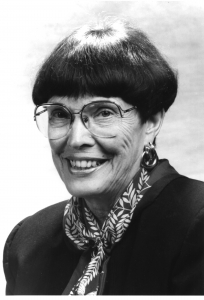A pioneering chemist, Helen Murray Free conducted scientific research that revolutionized diagnostic testing in the laboratory and at home.
Free attended college intending to major in English and Latin. However, due to the events of Pearl Harbor and subsequent enlistment and drafting of men into the army, women were strongly encouraged to pursue careers in science. Helen then changed her major to chemistry, receiving her B.S. from the College of Wooster in 1945.
Upon her graduation, Free immediately began work as a quality control chemist at Miles Laboratories, later acquired by Bayer Diagnostics. While at Miles, Free served as a researcher, director, and manager. She also met Alfred Free, a noted biochemist. They married in 1947.
Together, the Frees became life-long scientific partners and changed the face of medical diagnostics. Some of their early work centered around the improvement of the Clinitest, a tablet that measured glucose levels in the urine of diabetic patients. They went on to develop the Acetest, another tablet test for diabetes. Their research culminated in the development of Clinistix, the first dip-and-read diagnostic test strips for monitoring glucose in urine.
In 1975, the Frees co-authored their second book, Urinalysis in Laboratory Practice, which is still a standard work in the field. They also developed additional strips for testing levels of key indicators for other diseases.
Although she retired in 1982, Free continues to be a strong advocate of science education, paying special attention to female and underprivileged students through programs like Kids & Chemistry and Expanding Your Horizons.
Free holds seven patents and is the recipient of numerous awards including the American Chemical Society’s Garvan Medal (1980), the National Medal of Technology and Innovation (2010), and the American Chemical Society’s 66th National Historic Chemical Landmark designation (2010).
Today, the availability and low cost of dip-and-read strips make testing for diabetes, pregnancy, and other conditions available in underdeveloped regions of the United States and in foreign countries, saving or extending countless lives.

